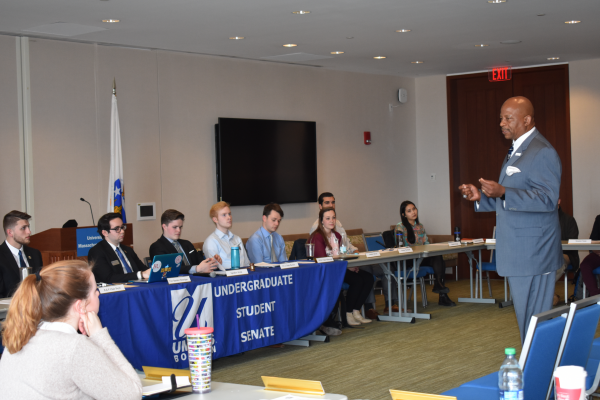April 26, 2017

Chancellor Keith Motley speaks before the UMass Boston undergraduate student senate. Pantea Fatemi Ardestani photo
The fallout from UMass Boston Chancellor J. Keith Motley’s resignation continues this week amid increased scrutiny about the campus’s financial woes.
A group of community leaders led by Rev. Liz Walker are demanding a meeting with university administrators and city and state politicians aimed at deconstructing the events that led to Motley’s removal two weeks ago.
Among other things, Walker said, the community wants assurances that Motley is not the victim of a “scapegoating” campaign. “We’d like to make sure that that’s not the case,” she said. “All we want to do is talk to people who are more closely connected to this to find out.”
Motley will leave his post in June with plans to begin a yearlong sabbatical before returning to the Dorchester campus as a tenured professor. His resignation came after a flurry of stories in the Boston Globe and meetings with UMass board members about campus debt, with estimates ranging between $6 and $30 million, including a structural deficit.
Student leaders, many of whom have expressed a desire for Motley to stay on as chancellor, still object to the loss of a man they say has been an active and communicative leader. A resolution calling on the chancellor to rescind his resignation made it onto the student General Assembly agenda at the final meeting of the year, but did not come to discussion for logistical reasons.
Motley bade farewell and offered his heartfelt thanks to the student government during a half-hour visit to a meeting of the undergraduate student senate last Wednesday. “This institution is on the move,” he told the students.
“It’s scary for some people that we woke up. And here we come. And guess what I’m proudest about? It can’t be turned back. It’s here. It’s in the ground. It’s no longer just the idea of some folks from Dorchester, who had an idea of an institution over fifty years ago.”
He has heard the negative critiques of his leadership, as well as the students’ defense of him, Motley said. He had not spoken out, he added, with the exception of the prior week’s board of trustees meeting, but he told the solemn-faced students seated around him that “we all need to improve; nothing is perfect.”
Nonetheless, he said, he remains proud of the changes to the campus during his tenure.
“Our work defends itself,” Motley said. “My responsibility to you is not to be an idiot about this work. It’s to keep up the dignity of this role, to respect it, and to operate like that for you, and to model for you what that means. And take all the incoming, because that’s what leaders do.
“Because in time — time being the wisest counsellor — all will be revealed,” he added. “So as I said, three years from now, let’s all go for a walk. Let’s set up a date. A few of you will still be at the school about to graduate in three years. So … we’re gonna walk the campus. You know, and these students here are gonna be striding; and I don’t have to talk, all I have to do is point. Just point and spin in a circle, right.”
As the students chuckled, Motley spun around and pointed out the Campus Center windows.
“That’s all I have to do,” he said. “That’s all you have to do. You don’t have to defend your chancellor. You understand? Defend me by graduating, going on to have incredible lives.”
Rev. Walker, who signed a letter on behalf of the Friends of UMass Boston last week, pressed UMass President Martin Meehan and Board of Trustees chair Robert Manning to respond to a letter sent in early April registering concern over the circumstances of Motley’s departure.
Walker said the group plans to host a community meeting to discuss their concerns, which she said is planned for early May. A final date and venue has not yet been set. Motley’s departure is a warning signal, she said, that there may be “systemic” problems at the campus that have not been shared with the neighborhoods.
“The university is, as we understand it, an institution for the common good,” she told the Reporter. “Motley represented the best of that because he always worked for everybody; not just students from abroad, but students in the community, who might not have access to higher education if not for schools like the UMass Boston campus.”
Mayor Martin Walsh, who had not previously commented on Motley’s pending departure, weighed in this week.
“Keith Motley has played an important role at UMass Boston and in our city,” the mayor said in a statement to the Reporter. “He provided us with a valuable perspective and vision for higher education in Boston, and I want to thank him for his service. For the good of the UMass system and education in this city, we need to put the controversy behind us and work together to move this important institution forward.”
While Walker agrees with the need to move forward, she said the lingering concern of the community “is no longer just about Keith Motley.” Given the current political climate, she said, “We’re living in times where we have to be vigilant about systems,” she said. “Systems that protect the common good are being threatened from all kind of directions.”
Walker added that she wants other UMass leaders – and the governor and mayor as well – to come to the table and explain how the decision shook out. “I don’t think it has been shared,” she said. “Or maybe the questions haven’t been asked loudly enough.”
Jennifer Smith can be reached at jennifer.smith@dotnews.com or @JennDotSmith on Twitter.
Topics:


